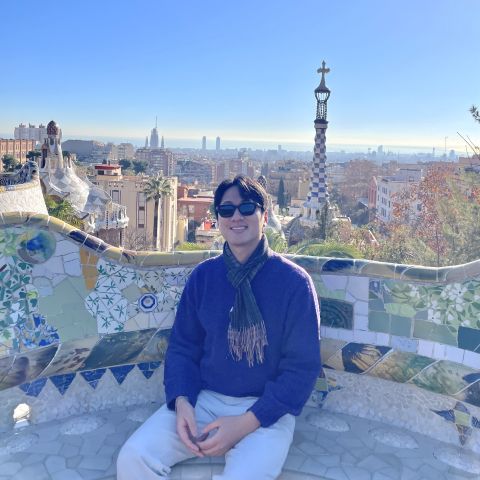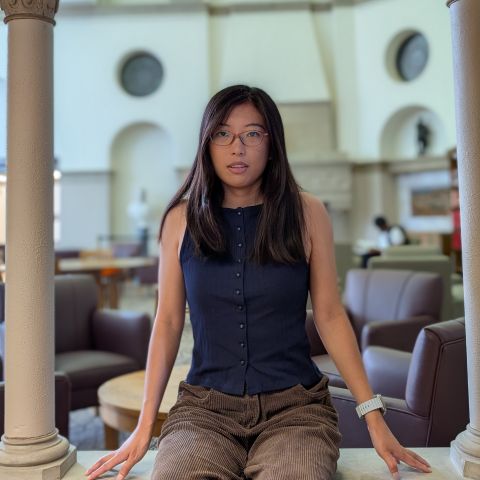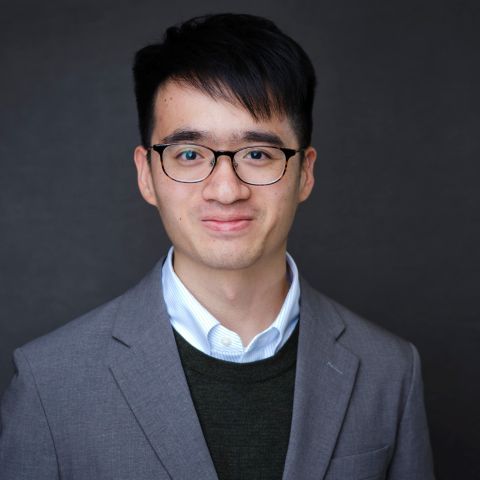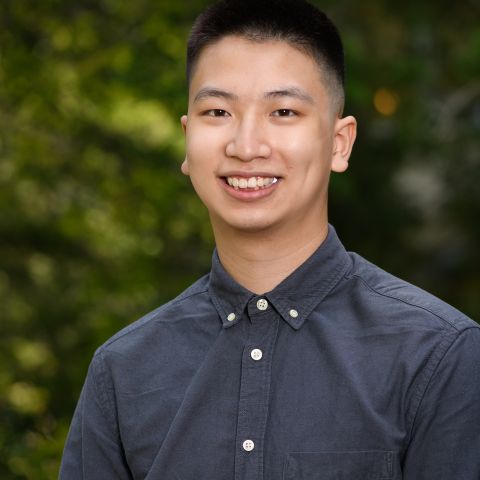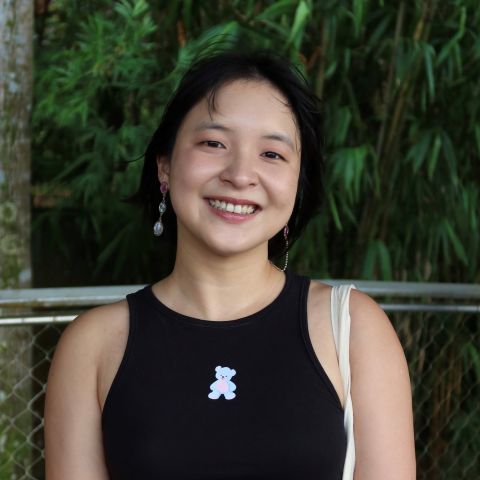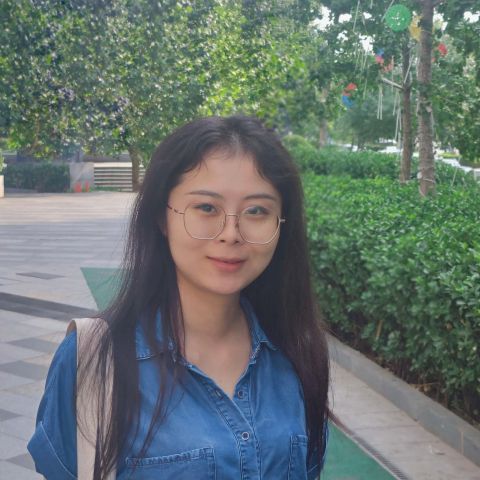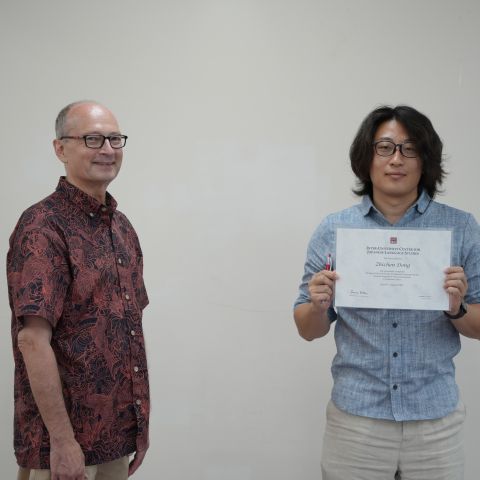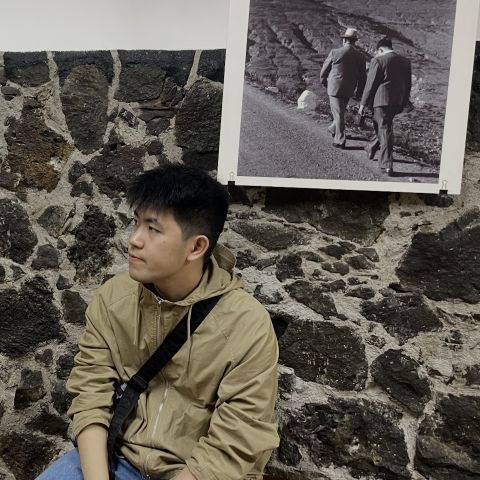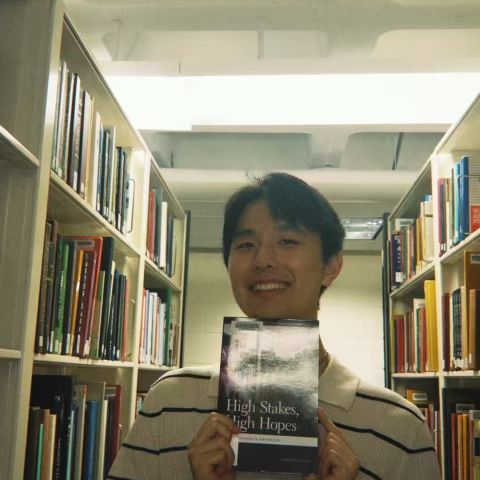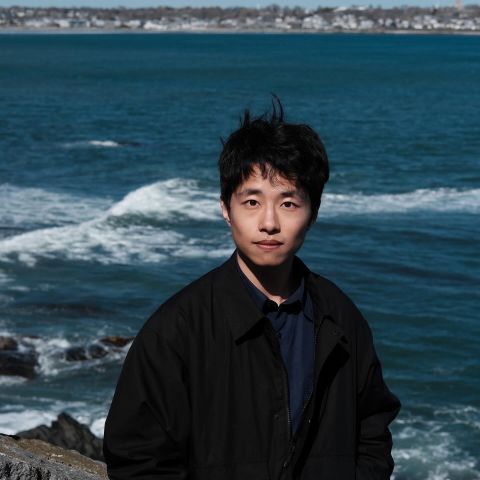Announcing 2025-2026 EAP Fellowship and Grant Recipients
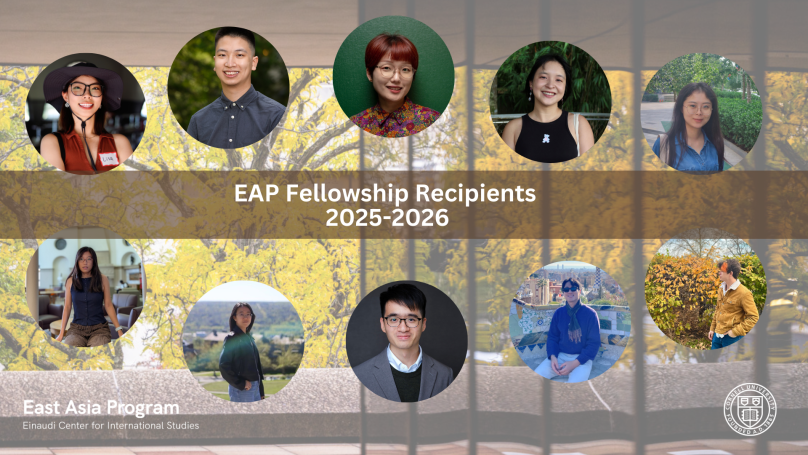
Congratulations to the EAP Fellowship and Grant Recipients!
The East Asia Program is proud to support the research of Cornell students.
C.V. Starr Fellowship
Youngdong Cho (Linguistics)
On the Nature of Speaker’s Negative Bias in Questions
Youngdong’s current research investigates the nature of speaker’s negative bias in question constructions, with a focus on Korean. Specifically, he examines how speaker’s negative attitudes are conveyed in questions that lack explicit negative elements. This phenomenon raises several important issues. Semantically, it involves a mismatch between form and meaning, as negative interpretations arise despite the absence of overt negative elements. Pragmatically, it is necessary to account for the discourse contexts in which these questions occur and the conversational moves they perform, as such questions are often reactive. In addition, Youngdong’s work compares these questions with rhetorical questions, further refining our understanding of so-called non-canonical questions. His project highlights the interplay between semantics and pragmatics in deriving speaker bias and has the potential for cross-linguistic extension to other East Asian languages, such as Cantonese and Mandarin.
Qianye Yu (History of Architecture and Urban Development)
Transactional Friendship: The Role of Chinese “Architectural Aid” in the Socialist State-Making of Tanzania (1964–1976)
Qianye’s dissertation studies Chinese “architectural aid” in post-Independence Tanzania (1964–1976) under Mao’s Third World Theory. By analyzing the building history of three large-scale aid projects – the Ruvu State Farm, the Urafiki (Friendship) Textile Mill, and the Tanzania-Zambia Railway, this dissertation illuminates how China’s architectural aid influenced the socialist state-making of Tanzania by involving in the two-fold task of Julius Nyerere’s nascent regime: one was to break away from the material legacies of German and British Colonial rules, and another was to build a centralized administration structure that did away with native authorities based on kinship. A collective of Chinese state-owned enterprises, which operated across diverse regions from the east coast to the Central Asian borderland, implemented this architectural aid through militarized labor organization and adapted Chinese socialist spatial patterns in alignment with Tanzania's First and Second Five-Year Plans. This dissertation expands the scholarship on Mao-era foreign relations beyond the focus on diplomacy by examining how China showcased its socialist achievement and promoted its revolutionary agenda globally through zealous investment in aid projects overseas. It also complicates the discussion of Cultural Revolution as solely anti-intellectuals or anti-technocrats by documenting the organizational and technological progress in infrastructure development during this era.
Yao Zhang (Linguistics)
Investigating Factors in Chinese-to-Yi Tone Adaptation
Yao’s research focuses on Nuosu Yi, a minority ethnic language spoken in the southern Sichuan and northern Yunnan in southwestern China. Due to the ethnic integration and frequent communication with Chinese speakers, Nuosu Yi has incorporated numerous words from Middle Chinese to modern Mandarin dialects. The tone patterns of loanwords in Nuosu Yi align with a broader trend in East Asian tonal languages, that native phonological constraints can become more pronounced in loanwords than in native lexicon, sometimes taking precedence over direct surface similarity, which is typically a dominant factor in loanwords.
Yao’s study aims to investigate whether and how Nuosu Yi dialects vary in their tonal borrowing patterns as the source vocabulary and language change, employing both theoretical analysis and experimental methods. The findings from her project contribute to a deeper understanding of Nuosu Yi's grammar and the distinctive mechanisms governing its tone adaptation. Furthermore, her project underscores the critical role of understudied languages in refining linguistic theory, offering new insights into the dynamics of language contact and the typological uniqueness of East Asian tonal systems.
Fengyue Zhao (Linguistics)
Learning Complex Cantonese Tone System in Naturalistic Speech
Fengyue Zhao’s research explores how infants might acquire tonal categories in Cantonese, a language with six tones distinguished solely by pitch. In Cantonese, a single syllable can have multiple meanings depending on its tone—for example, si can mean poetry (si1), history (si2), to try (si3), time (si4), market (si5), or to be (si6). While previous research on speech sound learning has primarily focused on vowel and consonant contrasts, the acquisition of tonal systems remains less understood, despite the prevalence of tone languages worldwide. Her research integrates corpus analysis, computational modeling, and experimental methods to ask: Why are some tone pairs in Cantonese harder to learn than others? Her research suggests that infants act as “statisticians,” learning tone categories by tracking how tones vary across different linguistic contexts—such as surrounding sounds or sentence position—a process known as distributional learning across contexts. Rather than relying solely on pitch height, infants may use variability across contexts to form distinct tonal categories. Beyond theoretical contributions, this research has broader implications for language preservation. Recent sound changes in Cantonese, where certain tone pairs that are difficult to learn are merging, simplifying the tonal system. Insights from this work could inform strategies to document and maintain tonal distinctions, ultimately supporting linguistic diversity and cultural heritage.
Diverse Knowledge East Asia
Song Han (Comparative Literature)
Zones of Exception: Aesthetic and Economic Experiments after Rising Asia
As special zones of economy, trade, or duty proliferate in Asia, states are making exceptions in governing practices to compete in the global economy. However, at what points do zones become special, and what happened when these experiments "failed"? My project examines the special zones of China in the making and argues that they are always already conditioned by aesthetic practices, where Chinese writers, artists, and intellectuals constantly interrogate the cultural logics of contemporary economics.
I will focus on specific zones, such as Shanghai, Shenzhen, and Hainan, as well as virtual zones sustained by blockchain technologies, unearthing a neglected archive of literature, intellectual history, and conceptual and digital arts. With the EAP Fellowship, I plan to visit art archives and libraries in Haikou, Beijing, and Hong Kong, illuminating the current discussions of economic humanities through sociohistorical development in Asia.
Jessie Taieun Yoon (Performing and Media Arts)
Pretense: Performing Asia as Queerly Feminine in Transnational Artworlds
Yoon's dissertation, titled Pretense: Performing Asia as Queerly Feminine in Transnational Artworlds, examines contemporary performance and media that are aesthetically excessive and affectively insincere in their representation of Asianness. Theatrically professing and reappropriating Asian and Asiatic aesthetics as queerly feminine, the artworks Yoon examines challenge both Orientalism and cultural nationalism rooted in notions of racial authenticity. By interrogating the cultural processes of (re)producing Asian racialization as fundamentally gendered and sexualized, Pretense intervenes in the racially gendered labeling of Asian femininity as “pretentious”—both as an aesthetic judgment of excess and as a form of contested sincerity. Diverse Knowledge East Asia fellowship will enable Yoon's continued engagement with the transnational scenes of performing and media arts of Asian diaspora, by facilitating their conversation with artists, curators, scholars, and archives in Stockholm, Seoul, Basel, Hong Kong, Shanghai, London, and many more.
Lee Teng Hui Fellowship
Samuel Liu (Government)
It's Not What You Say, It's What They Hear: Resistance to Coercive Diplomacy in Taiwan
Samuel’s research examines the logic of great powers’ use of coercion by focusing on the downstream effects of China’s military, economic, and diplomatic coercion on Taiwan. Using survey experiments, qualitative interviews, and case studies, his dissertation explores why costly actions by China – economic decoupling, military intimidation, and threats of war – have not been able to bring Taiwan back to the negotiation table despite the fact that these signals are often understood in Taiwan as costly, threatening, and imminent. Specifically, he considers how threats from China have uneven consequences for the elites in Taiwan and the broader society, starting from the 1996 Second Taiwan Strait Crisis to current cross-strait relations. He combines insights from the fields of international relations, communication, and psychology and argues that failures in coercive diplomacy are a result of communication gaps between senders and receivers of signals across the Taiwan strait.
Ha Pham (Economics)
Charging Forward: Policy Options to Electrify Two-wheelers
My research project aims to study the adoption of electric two-wheelers (E2Ws) by consumers and to identify cost-effective methods to promote the adoption of E2Ws in East and Southeast Asia. While passenger cars are the preferred primary mode of transportation in other economies, two-wheelers are the most prominent in these regions. Most two-wheelers currently use internal combustion engines, which generate a lot of pollution. Given the severe air pollution and the substantial potential environmental benefits of fleet electrification in East and Southeast Asia, economics research on the electrification process in these countries is scarce. In the first part of the project, I use vehicle sales data from the largest two-wheeler markets in East and Southeast Asia, including Taiwan, Thailand, Vietnam, the Philippines, Indonesia, and Malaysia, to estimate demand for two-wheelers. Using these estimates, I compare the impacts of different policy tools, including product choice expansion, fuel tax, minimum fuel efficiency standard and consumer subsidies. In addition to studying this problem using observational data, in the second part of the project, I study the demand for E2Ws in Hanoi, Vietnam, through a randomized controlled trial. I aim to implement randomized interventions that include providing information about user costs and the environmental impacts of gasoline motorcycles and E2Ws, offering replacement subsidies for E2Ws, and enhancing charging access and safety. The results of this study will offer insights for expanding these practices and will guide policy decisions aimed at reducing emissions from urban transportation while improving urban mobility in East and Southeast Asian countries. This is particularly relevant considering the ongoing rapid urbanization and motorization trends.
Lijun Zhang (History)
Mobile Women, Fluid Laws: Regulating Interethnic Intimacies across the South Seas, 1890s-1950s
Lijun’s dissertation project centers interethnic intimacies between ethnic Chinese and people of other Asian ethnicities in British Malaya. It asks how these intimate relationships shaped the political, legal, and social practices of British Malaya and Southeastern China between the late nineteenth century and 1950s. Using government and legal records, newspapers, literary productions, and oral histories, the project investigates how “interasian intimacies” molded the construction of racial and gender hierarchies within Asian communities in colonial times and impacted the making of citizenship and belonging in the era of decolonization. In doing so, the project also highlights female mobility in crossing boundaries of space, ethnicity and religion, thus challenging the male-centric narrative of migration across the South Seas.
Robert J. Smith Fellowship
Yuanxue Jing (Asian Studies)
Mobile Technologies in Japan
My summer research explores the intersection of mobile media, gender, and storytelling in contemporary Japan. Focusing on keitai shōsetsu (mobile phone novels), I investigate how girls and young women use media to share intimate experiences. These mobile novels emerged in the early 2000s as a literary form shaped by technological constraints such as limited character input and small screens. I argue against a teleological narrative of progress that assumes new literal-technologies simply displace older forms. Instead, I emphasize continuities across media, particularly in the affective and participatory dimensions of girl-centered literary production. Rather than viewing mobile novels as a radical break from previous literary genres, I situate them within a longer genealogy of interactive writing practices, notably reader submission columns in women’s and teen fashion magazines such as Popteen. These columns enabled serialized, reader-influenced storytelling—a mode of production that mobile novels inherit and accelerate through digital infrastructures. By examining mobile novels as part of a broader shōjo (girls’) media ecosystem—including manga, fashion, and suburban consumption—I aim to understand how media and mobility shape gendered communication and community-making in Japan.
Andrea Mariucci (Asian Studies)
Mapping Technologists: Microcomputing infrastructure, and those who play with it
This research project is aimed at providing an account of informal or otherwise non-institutional experimentation with technology in Japan by centering amateur computer engineers in the period roughly spanning 1970-1995. The period of reference covers the initial release of the first consumer microcomputers by domestic companies such as NEC, Sharp, Fujitsu, and ASCII, up until the widespread adoption of Windows and Apple operating systems in the late 1990s and early 2000s. This project is largely based on the collection and examination of personal histories of individuals and circles who were active as programmers, engineers, or who would otherwise engage in activities such as import and distribution of components, publishing of official and fan-produced magazines, or organization and attendance of specialized conventions and gatherings, as well as the materials produced and circulated at the time.
Language Study Grants
Kevin Dong (Asian Studies)
Kevin Dong spent this summer attending the Inter-University Center for Japanese Studies (IUC) Summer Program to gain advanced knowledge of the Japanese language. Dong’s research focuses on the everyday experiences in the Japanese colonial empire, especially on the feelings of those who dealt with imperial structures and infrastructure. He aims to show that the circulation of certain shared feelings among subjects in Manchuria and Taiwan creates small blocks of heterogeneous communities whose actions disturb and distort colonial organizations. By examining cultural products such as poetry, music records, and dance textbooks, his project investigates how cultural products help us understand people’s strategic survival in an empire and their response to emotional dilemmas in the first half of the twentieth century.
Madeline McGee (Math)
Travel Grants
Bonnie Chung (Comparative Literature)
The Asian Diasporas Polyphonic Archive: Articulating the Islands of East Asia
My project explores the enduring legacies of postwar American foreign policy and military presence in Jeju Island, Taiwan, and Okinawa—islands still impacted by Cold War geopolitics and frequently overlooked in traditional realpolitik. I analyze how contemporary Asian diasporic literature critiques Anglophone dominance in the region by examining the U.S. relationship with major atrocities in the Asia-Pacific. Framing islands as central to the conceptualization of the transpacific, my project brings together narrative analysis, Cold War studies, and environmental humanities. Thanks to the ongoing support of the Einaudi Center and East Asia Program, I have been able to carry out field research in these interconnected East Asian archipelagoes.
Yuanyuan Duan (Asian Studies)
Sacralizing Body, Sacralizing Kingship: Esoteric Rituals and Buddhist Sovereignty in the Dali Kingdom (937-1254 CE)
This travel grant supports my additional archival research for a key chapter of my dissertation project: “Sacralizing Body, Sacralizing Kingship: Esoteric Rituals and Buddhist Sovereignty in the Dali kingdom (937-1254 CE).” This chapter examines how the Esoteric practice of embodiment plays upon the king’s body and transmigrates Buddha’s sacredness from the priest to the king in light of a group of unstudied Esoteric rituals manuals for consecrating the Dali kings, recovered from the Fazing si collection in Yunnan. As a follow-up to my former research trip in 2022, I plan to visit Yunnan Province Library (Kunming) in July 2025 to examine the image part of the collection, which has just been open to on-site inspection recently. These images include the illustration of the adept’s body and diagrams for ritual space arrangement. As the visual guides for ritual performance, these sources will complement my existing research on the textual basis.
Zhiren Hu (Dyson School of Applied Economics and Management)
Efficiency of Public Service Outsourcing: Evidence from Foreclosure Auctions in China
This study examines how outsourcing public services from the public sector to private entities affects the efficiency of service delivery, and how such outsourcing contracts should be designed. By analyzing the outsourcing of judicial auctions in China’s court system between 2015 and 2024, the study finds that outsourcing public services can significantly improve the success rate of judicial auctions, but only when the contracts adopt a revenue-sharing scheme rather than a fixed-commission one.
When private agencies are incentivized through revenue-sharing, they take proactive steps to reduce search frictions in the market, enhance the accuracy of information disclosure about auctioned assets, and leverage their greater credibility with potential buyers. These factors collectively contribute to improved market efficiency. The analysis suggests that if all judicial auctions during this period in China had been outsourced to private auction houses, debtors could have gained at least an additional $1 billion in proceeds.
Chengxiang Lin (Asian Studies)
Energizing the State: Oil Extraction and Labor Mobilization in the Socialist Anthropocene
With the support of the EAP Travel Grant, Chengxiang spent two weeks this summer conducting fieldwork in Daqing, Heilongjiang—home to China’s largest oil field. He visited local museums, libraries, and energy facilities, all of which enriched his understanding of the natural and cultural legacies of oil extraction in China. The archival materials he collected will form the foundation of a dissertation chapter focused on the petroculture of China’s socialist era.
Nianpo Su (Linguistics)
Logphoric Pronouns in Nuosu Yi
This summer, Nianpo conducted fieldwork on Nuosu Yi, a Tibeto-Burman language spoken in Southwest China. Working in both Xichang and Chengdu, she collaborated with native speakers and local scholars to document and analyze the use of definiteness and anaphoric expressions across different linguistic contexts. As a rising fifth-year Ph.D. student in Linguistics with a minor in Cognitive Science, she is particularly interested in the syntactic structure and semantic interpretation of determiner phrases in classifier languages. Drawing on experimental data, her research highlights the importance of under-documented languages in testing and refining contemporary linguistic theory.
Hantao Sun (City and Regional Planning)
Recreating urban regions, making the local Chinese state: Dynamics of county-founding in Feidong, 1949
Hantao's research returns to the founding moment of the People's Republic of China (PRC) in 1949 to investigate the tension between regional urban dynamics and local state-building. In particular, he looks at the decision on the location of the newly-founded county (县) government in Feidong area, a region near Hefei that was composed of three small urban clusters before the PRC, to study the local conjuncture shaped by and reshaped a concept of a new nation, a new administrative unit, and a new core-periphery relationship. By delving into the archives concerning the everyday, procedural, and sometimes informal practices that enabled this decision, this study puts the smaller Chinese cities into the longue durée of regional history and contributes to an understanding of the political-economic legacy that contemporary cities seek to transform yet are unavoidably embedded in.
Amy Wei (Asian Studies)
Cripping Cartographies: Reading for Disability Dialogics in Modern and Contemporary Japanese Literature
Amy’s current project examines works of modern and contemporary Japanese fiction and poetry as critical sites for the assertion of crip potentiality and embodied, crip futurity. Her work develops a theory of mediation that allows us to actively imagine and make claims for the crip and cripqueer modalities, as well as a dialogic approach to a critical disability intervention in key theoretical and literary landscapes surrounding the non-normative body in 20th- and 21st-century Japan. Engaging with avant-garde modernist poetry of the 1920s, ecocritical and environmental writing of the 1960s and 1970s, queer narratives of heightened and increasing attention from the 1990s, and speculative post-disaster fiction of the 2010s, Amy’s project attends to the critical role that disability plays in animating the narrative and discursive spaces of these literary movements and aims to open up myriad dialectical spaces shaped by the nonpresence of disability. In so doing, her work argues for the potential in centering cripqueer bodies in articulating alternative epistemological and ontological modalities, and in mediating and (re)imagining the conditions of our lived presents and shared futurities.
Tsuguta Yamashita (Asian Studies)
Tsuguta's dissertation investigates how diplomacy and spatial production mutually shape one another. Framing inter-urban relations as multilateral circulations of visions of modernity, technological expertise, and construction materials, it analyzes urban development projects implemented under Japan’s postwar reparation schemes, agreed upon in 1958, for its wartime occupation of Indonesia (1942-45). Envisioned by President Sukarno—an architect by training—the emphasis on architectural projects distinguished the Indonesian case from Japan’s reparations to other countries. This dissertation argues that, as postwar reparations were diverted from a medium of reconciliation into instruments for Japan’s economic expansion and Indonesia’s authoritarian display, these architectures became monuments to the unfulfilled promise of redress, fueling anti-Japanese sentiment.
Yuanlong Yu (Architecture)
New Chinese Urban Open Space: A Case Study of the Pocket Park Initiative in Nanjing, China
Yuanlong’s research focuses on the emergence of pocket parks and other forms of community-scale infrastructure in China, through which he investigates the country’s urban transition over the past decade—from a "development-driven model" to a more "human-centered approach". Specifically, he examines how the “15-minute city” model reshapes the physical form and everyday life of urban communities, which are the fundamental units of the city. His work aims to explore a new urban spatial model that allows for public participation within a state-supported framework—situated between government and real estate-led development on one end and informal urbanism on the other.
With support from the East Asia Program, Yuanlong is conducting fieldwork in cities such as Beijing and Nanjing during the summer, researching current urban community conditions, participatory design processes,
Yiang Zhu (Cornell Law School)
Eviction in China: Practices, Legal Gap, and Social Norms
Yiang’s project aims to empirically examine how eviction is regulated in China. Eviction is a pressing social issue that contributes to housing instability. In the U.S., landlord-tenant law has undergone intense debates and numerous reforms over the past decades, yet the real-world consequences of these legal changes remain contested. In contrast, eviction has rarely been a policy priority in China, despite the country having similarly large rental markets. Remarkably, the Chinese rental market functions without a specific legal framework governing eviction. How, then, does eviction occur in China?
This study seeks to answer this question through ethnographic research. It will explore how landlords and tenants navigate eviction disputes in Shanghai and how the megacity’s grassroots governance structures facilitate dispute resolution. Theoretically, this project contributes to the scholarship on law and social norms, while also offering comparative insights into lease law. Finally, it aims to provide evidence-based policy recommendations.

